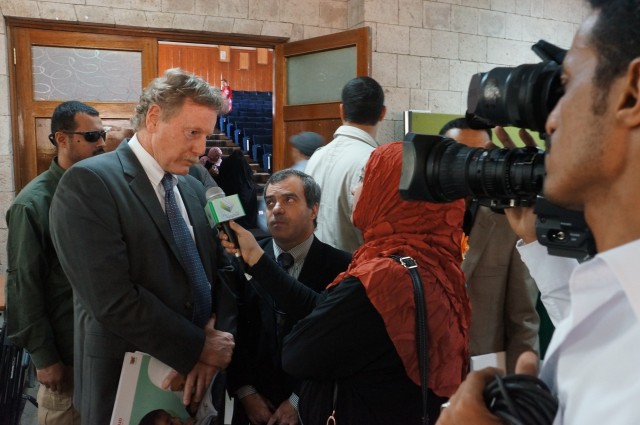[vc_row][vc_column width=”1/1″][vc_column_text]
Yemen campaign to spark culture of reading
By Creative Associates International
[/vc_column_text][/vc_column][/vc_row][vc_row][vc_column width=”2/3″][vc_column_text]

Encouraging young children to read is one of the best ways to create a better future for Yemen, according to the U.S. Agency for International Development Mission Director Herbie Smith.
Smith addressed a crowd of more than 200 people on Sept. 28 at the Educational Research Development Center in Sana’a as USAID, Creative Associates International and the Ministry of Education launched the Yemen Reading Campaign.
“Better reading skills lead to higher academic achievement for school children, who will then grow up to be knowledgeable, skilled and productive citizens of this great country,” Smith said
The campaign, designed to promote a culture of reading—particularly among children who are reading at below-grade levels—is a media thrust consisting of audiovisual messages, SMS messages and print materials.
“Reading is fun and provides children with the basis for all learning,” said Smith. “We hope that this campaign will help make Yemen a country of readers.”
Low levels of reading
The campaign complements the Yemen Early Grade Reading Approach (YEGRA), an innovative program now in use in 310 schools across the country (with 500 schools being added this year) that showed highly promising results during a trial implementation during the previous school year.
The YEGRA program was developed through strong partnership among USAID Creative’s Community Livelihoods Project and Yemen’s Ministry of Education in response to the alarming results of a 2011 Early Grade Reading Assessment.
The 2011 study revealed that almost one third of third-graders in Yemen were not able to read a single word, while the average third-grader was barely able to read.
“We have heard of cases of children who learned to read through the YEGRA, who are now teaching their parents to read,” Smith said. “There are also parents who have requested special adult literacy courses as a result. We are all in this together. There is no limit to what a highly literate citizenry can achieve.”
Reaching a broad audience
The national reading campaign will run for three months and includes television and radio public service announcements (PSAs), a mini documentary on YEGRA and street banners.
All campaign elements focus on encouraging parents and communities to support children’s reading.
Mobile service providers are supporting the campaign by broadcasting its key messages to an estimated 9 million subscribers via SMS.
Several television channels started airing the television and radio PSAs the same day as the launch event, giving free airtime to the campaign.
Officials at the Ministry of Education describe it as the biggest campaign that has been undertaken in Yemen to date about the importance of reading.
Literacy is essential for the people of Yemen to progress and develop, according to Minister of Education Abdulrazzaq Al-Ashwal.
It is “a source of life, power and freedom and it’s the most important tool needed to build a new Yemen,” he said.
Reporting contributed by Dorelyn Jose, Salwa Al-Azzani and Pierre Beaulne.[/vc_column_text][/vc_column][vc_column width=”1/12″][/vc_column][vc_column width=”1/4″][vc_widget_sidebar sidebar_id=”sidebar-primary”][/vc_column][/vc_row]